University vs Language School 💥
Welcome to another Versus blog! And it’s certainly not small one – University vs Language School.
Today we are discussing a topic that lot of language students have been thinking about maybe at least once in their school life: WHERE should you study a foreign language?
LTL is a Chinese language school so, of course, Mandarin Chinese will be mentioned a lot, but this blog actually concerns ANY language learner!
If you want to study a foreign language and are committed, but have no clue as to what is the best place to study it, you will find this article is packed with valuable information that might help you make a decision, by comparing the pros and cons of a university vs language school.
- Where can I make better progress?
- What place is the best to learn a language?
- Is a university really immersive?
- Aren’t private schools super expensive?
We will try to answer all of these questions and more!
If you have experience in any of these institutions and would like to share your story, feel free to leave a comment down below, we’d be very happy to hear what you think.
DISCLAIMER – Every person is different, and every teaching institution does not fit everyone. So be aware that there is no two similar cases and you need to take into account what would work for you and only YOU.

To give you a little bit information about my background: I have studied International Business for a semester at Ocean University in Qingdao in 2013 and did a Chinese language semester program at Suzhou University in 2018. I took Chinese classes at LTL Beijing in 2015, and had Chinese language as one of my majors at university in France, so I have a lot of experience in all areas I’ll be mentioning in this article.
Skip to the chapter you’re most interested about:
FAQ #1 – What are the main differences between University vs Language School?
FAQ #2 – What are the main advantages and disadvantages of each institution?
FAQ #3 – Which is better, University or Language School?
University vs Language School – Interesting Facts about Studying Abroad
University vs Language School – Testimonials 🗣
University vs Language School – Things To Know Before Studying Abroad
University vs Language School – FAQ’s

Online vs Offline Learning 🙇🏼♀️ What’s Best?
Online vs Offline Learning – Find out what’s best according to your situation and your individual needs. Do you research, take your time, decide!
What Are the Main Differences Between University vs Language School?
Let’s dive right in with some explanations about what exactly University and Language Schools are.
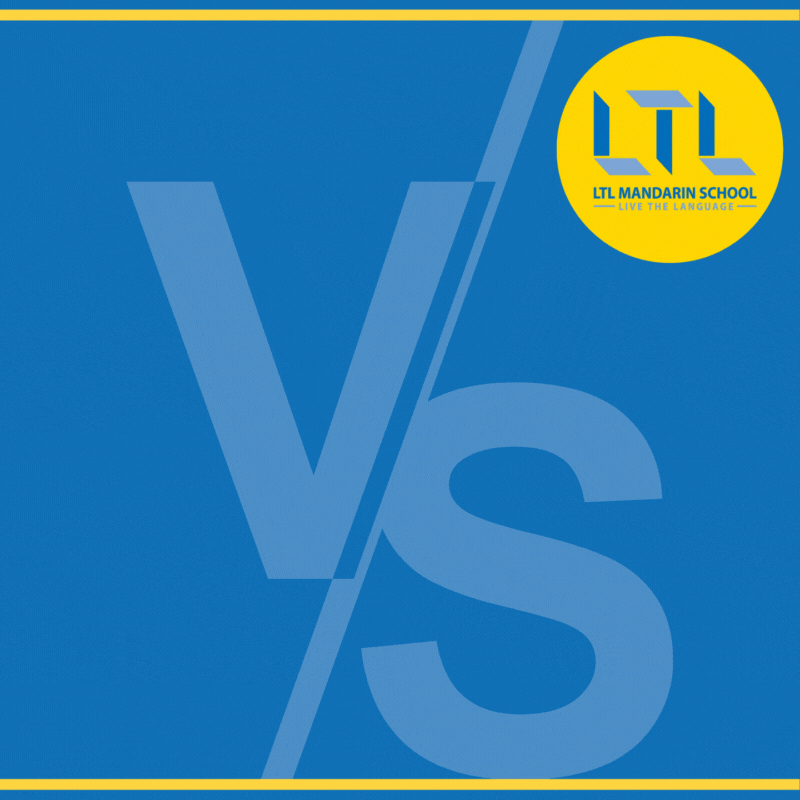
University – A university is an institution of higher education offering under graduate and graduates programs that can also lead to PhDs or doctorates. Most of the time universities are funded by the state, but they can also receive private donations.
They offer training in a lot of various domains, such as social science, medicine, law etc. Local and foreign students can study in universities.
Language School – Language Schools are most of the time privately owned and do not depend on state funding. They offer programs in various foreign languages, and in the case of some language schools like LTL Mandarin School, schools offer courses in one specific language in the country of the language’s origin.
LTL Mandarin School for example is a private language school based in China, offering Mandarin Chinese courses to students from all over the world.
So here you’ve discovered your very first difference: the courses offered in both institutions are not the same at all.
The second main difference would be the size of each of them.
Whilst universities can welcome thousands of students, language schools will generally be a lot smaller, with hundreds or even less students at any given time.
Along with this will be the different size of the campus, buildings as well as number of classrooms.
Program durations will also be very different. Universities have a fixed schedule divided by semesters, however private language schools can offer more flexible options.
It means that whereas you don’t have a choice on your start date at university, you can choose to study at more flexible times of the year in a language school, and thus organise your time accordingly.
Speaking of start dates, when a student starts a study program somewhere accommodation is usually a big concern.
Universities offer accommodation in dormitories, where students share a room and commodities. Language schools will offer a wider accommodation selection, in most instances this would be shared apartments as well as homestay families.
Last but not least in these main differences between university vs language school: student support.
At university, depending on your demands, you’ll be directed to the relevant bureau. In a private language school, as the place and team are a lot smaller, support and help are pretty straight forward.
Students usually ask their student advisor for any help they might need.
To quickly sum up:
| University | Language School |
|---|---|
| Large institution | Small institution |
| Public | Private (mostly) |
| Thousands of students at all times | Hundreds of students or less at all times |
| Fixed schedule & start dates | Flexible schedule & start dates |
| Dormitories | Shared apartments & Homestay Families |
| Delegate support to relevant offices | Personalised support |
What Are the Advantages & Disadvantages of Each Institution?
Unfortunately, as we many other things in life, we cannot only get the advantages of something without considering the disadvantages.
For this part about benefits and disadvantages, we will compare studying at university in your home country and studying at a private language school abroad, more specifically regarding a language program.
Learning a language at university at home and/or a language school abroad can be a very different experience and might not be suitable for everyone, so it’s important we lay things down first.
Let’s make a quick comparison first and have a look at each point made in more detail afterwards. Let’s start with studying a language at university:
| Benefits of Studying a Language at University at Home | Disadvantages of Studying a Language at University at Home |
|---|---|
| Great way to ease into language learning | Large class numbers |
| Campus life | Less opportunities to practice |
| Can take other classes on the side | Environment not immersive |
| Lots of social activities | Fixed start dates |
And now the same comparison benefits/disadvantages for studying a language in a language school abroad:
| Benefits of Studying a Language in a Language School Abroad | Disadvantages of Studying a Language in a Language School Abroad |
|---|---|
| Immersive Environment | Less social activities |
| Fast progress | No campus |
| Teaching by native professional teachers | Only language courses available |
| Small class numbers | Can be more expensive |
| Personalised support | |
| Flexible start dates |
This tables will give you a broad idea of the main benefits and disadvantages of university vs language school.
We can now have a look at them in more detail:
Institutions & Start Dates
It has been mentioned before, a university will be larger in size compared to a language school, which is usually a lot smaller, not having the various study departments, labs and other offices.
The scale of a language school being smaller, you might think it is not a good thing.
When the number of people you’ll meet will definitely be lower that at university, in a language school you will know literally everyone and be part of a small community, which implies a more personal touch. A family-like environment if you will.
Start dates will be the biggest difference between the two institutions.
If you’ve been to university or are studying at university at the moment, you probably had to start your program at a set date. No flexibility there.
One start date at the beginning of the first semester, another start date for the second.
Language schools are much more flexible in the sense that more start dates are offered throughout the year, and some are even open during holidays!
In our case at LTL Mandarin School, we offer numerous start dates to our students every month, and those with already some knowledge of the language can even start any Monday of the year.
LTL are also open 265 days a year meaning if you wish to study in an off-peak season (like Christmas) you can. This is not true of universities.
This way, students are not restricted in their projects and can always find suitable time to come study with us.

8 🗝 Benefits of Learning Mandarin 🤩 How It Improved My Life
The benefits of learning Mandarin are probably greater than you think. Learning Chinese cna take you far in many walks of life, but how exactly?
Class Sizes & Program Curriculum
As universities welcome thousands of students every year, depending on each university’s size, the number of students per class can be quite large.
As a university student myself majoring in English and Chinese, in both my home country and abroad, I can tell you that I have never been in a class with less than 20-30 students for any language course in any country.
I am writing only by experience here, so please if yours is very different and would like to share please let us know in the comments.
I found it really hard to speak, practice, ask questions, and get the teacher’s attention in such a large group of students. Being a shy person myself surely didn’t help!
Even though I met a lot of incredible people and made very good friends, progress was very slow and learning frustrating as I couldn’t reach my goals as fast as I would have liked.
Before working full time for LTL, I was first an LTL student in Beijing! The experience was completely different.
LTL Mandarin School as well as other language schools for any given language, offer smaller group classes (in LTL’s case an average of 3 students), a personalised follow-up and guidance, not to forget that the teacher is more available having less students to tend to.
Lesser students means more opportunity to practice, speak, ask questions and be heard.
About the Chinese language curriculum specifically, I found that in my experience, both university and language school have a similar approach, often using the same school books.
Please note this link is an affiliate link and LTL Mandarin School take a small cut of any sales made, with the rest going to Amazon and the lister of the product.
However, language schools also offer individual classes in addition to their group classes, which are entirely personalised to the student’s needs and demands, something a university could not possibly offer.
Social Interactions & Activities
We said it already, you’ll definitely meet less people in a language school compared to a university campus due to the size of the institution, either you think it is a good thing or not.
As a consequence of being a smaller place, social activities will also be fewer than at university. But it doesn’t mean there won’t be any! Only that the choice of activities organised will be more restricted.
REMINDER – When studying a foreign language abroad, please keep in mind that most of the learning also happens OUTSIDE of the school!
Make friends with native speakers of your target language, go out and speak with people on the street, in bars, clubs (both kinds), coffee shops etc.
Some people will prefer being in a very social environment, always offering new activities and clubs to join, getting more going out offers than actual time to go out, whereas other people will prefer a more community-like environment, knowing everyone on site by name. Your choice.
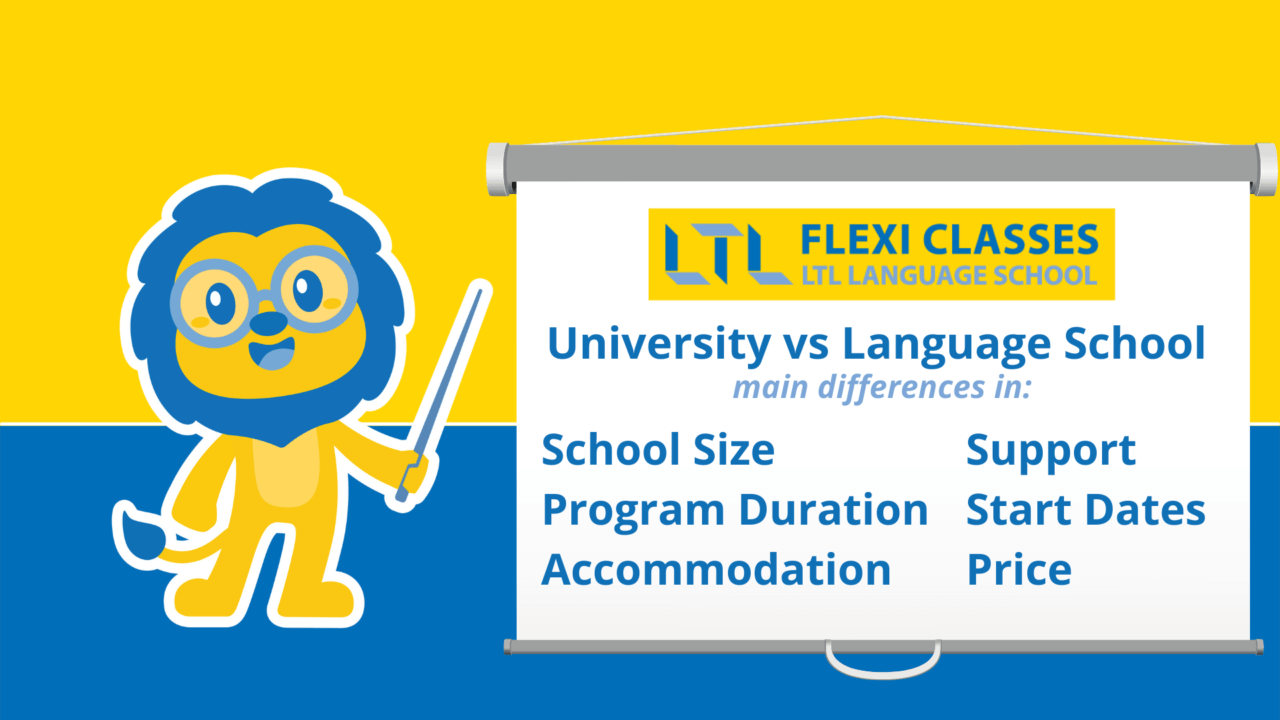
Immersive Environment
As an Immersion Expert I HAVE to mention this aspect of language learning.
It is widely known and has been proven, that studying a foreign language in an immersive environment is the best way to make fast and real progress.
What I mean by immersive, is being surrounded by native speakers, experiencing the country’s culture every day through social interactions, travel and food.
Unless you join an exchange semester abroad, or have lots of native speakers of your target language in class you also meet after school, you will have a hard time being immersed in language at university.
Right now you might think I am biased by my experience, but let me remind you that I actually learned 2 foreign languages (English and Mandarin Chinese) at both university AND language school, so I have some experience in the matter allowing me to make these comparisons.
Studying in a language school abroad will not only allow you to study in a smaller setting, but you’ll also be forced to speak the language after school, to make friends, go grocery shopping, take a taxi, order food etc.
Progress is only possible when you practice the language, and abroad you don’t really have a choice, especially in a country like China where very few people are comfortable with English.
Of course, everyone will experience things differently, but everyday practice and cultural immersion will definitely help you go further ahead.


Which is Better, University or Language School?
There is no fixed answer to that question, as we all study and make progress in different ways.
As we’ve seen previously, whilst a university will provide a bigger setting and a larger social environment, class sizes won’t allow for much practice and won’t be very culturally immersive.
A language school abroad will be a lot smaller in scale, allowing for smaller classes and thus more chance to speak and get the teacher’s attention.
Immersion in both the language and culture will be deep and important, but is not for everyone.
Another thing to mention that I didn’t speak about earlier because I don’t have much knowledge about this, is the price of the chosen language program.
Studying a language program at university and/or a language school will come at a certain price, so you’ll need to plan accordingly and choose depending on what you can or cannot do.
Also, if you are considering studying abroad and it is your first time, please be aware of the culture shock, that can be quite impressive and brutal in some countries more than others (China being one of them!).
In conclusion, studying a foreign language at university and a language school are both good options. Your choice will come down to what your goals are.
- Would you like to be completely fluent in your target language or is an intermediary level enough for you?
- Are you interested in the culture, way of life, history of the country associated with the language?
- Are you studying for work, for fun, to one day live in the country?
Define your goals, think about why you’re studying the language and where you’d like to make of your studies. If you are ever in need of guidance and want to study Mandarin Chinese specifically, feel free to contact us anytime.
I will give you the same piece of advice I used on my previous blog about Online vs Offline Learning:
Do your research, take your time, contact the relevant people from the education you’d like to get. Consider all your options and make a choice depending on what feels right for you. 加油 💪
Interesting Facts about Studying Abroad
Students leaving their home country to pursue their studies have seen a steady increase in numbers over the year, and we have all at some point thought about it, even more so if our field of study is about foreign languages.
I thought I would give you some interesting facts, just so you have an idea of how many students travel abroad in hope to get a better education every year.
- The world’s overall student population was 222 million students in total in 2017, an increase of 43% in the past 10 years.
- Considering only students in a graduate education 5,3 million students travelled abroad to study in 2017.
- In 1998 it was 2 million, and the number is expected to reach 9 million in 2027.
These numbers are already impressive, aren’t they?
- The countries with the biggest number of foreign students every year are three English speaking countries : the United States, the United Kingdom and Australia.
- In 2020, Australia had the largest number of international students: out of their overall student population, 31.1% were foreign. Canada follows with 23.7% of their students being international.
- The United States, the United Kingdom, Germany, France, and Australia are the most popular host countries for international students. Half of all international students in the world study in these five countries.
- China comes first in terms of number of local students studying abroad. In 2017, around one million Chinese students were doing a graduate program abroad.
Have you ever studied abroad? Let us know the country in the comments below!
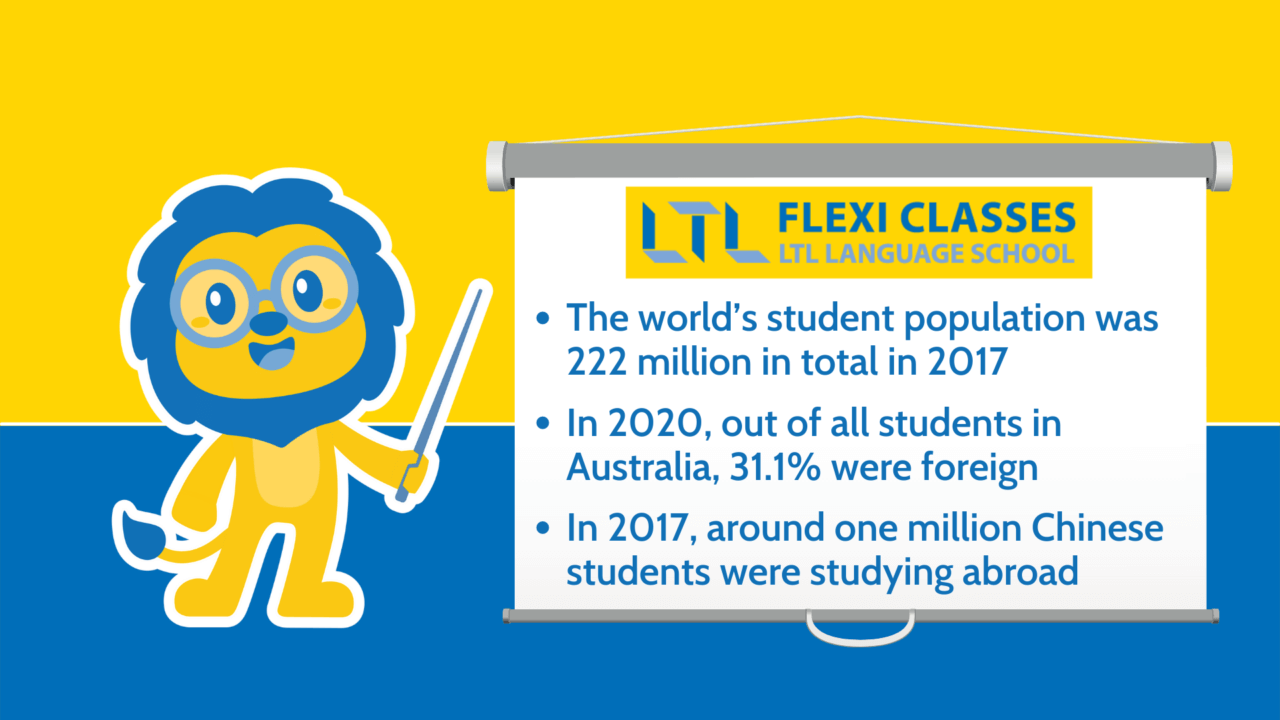
🌟 BONUS – LTL Mandarin School Facts
Here are some interesting facts about LTL Mandarin School specifically:
- LTL Mandarin School was founded in 2007 by Andreas Laimböck, and was almost called “Spaghetti Chinese“!
- We have 8 locations across Asia, as well as an Online School.
- Over the years, we have welcomed over 7,000 students from more than 115 countries.
- A total of 21 languages and 8 Chinese dialects are spoken by LTL staff members.
- Overall, a massive 100,000 hours of Chinese lessons have been taught since the creation of the school.
If you ever thought about learning Chinese, Online or in China and Taiwan, feel free to contact us for more details! 🙂
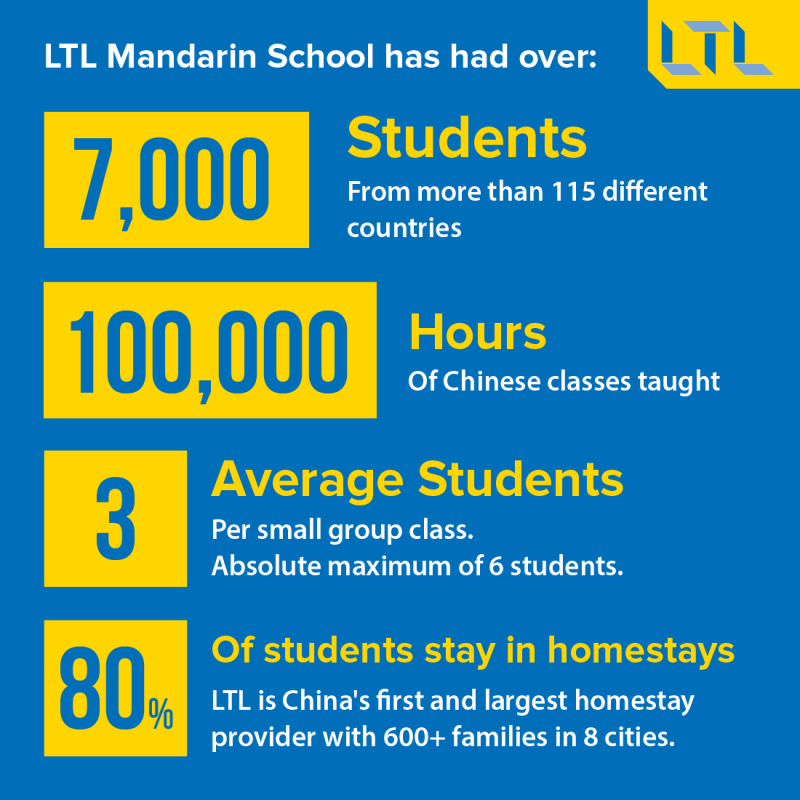
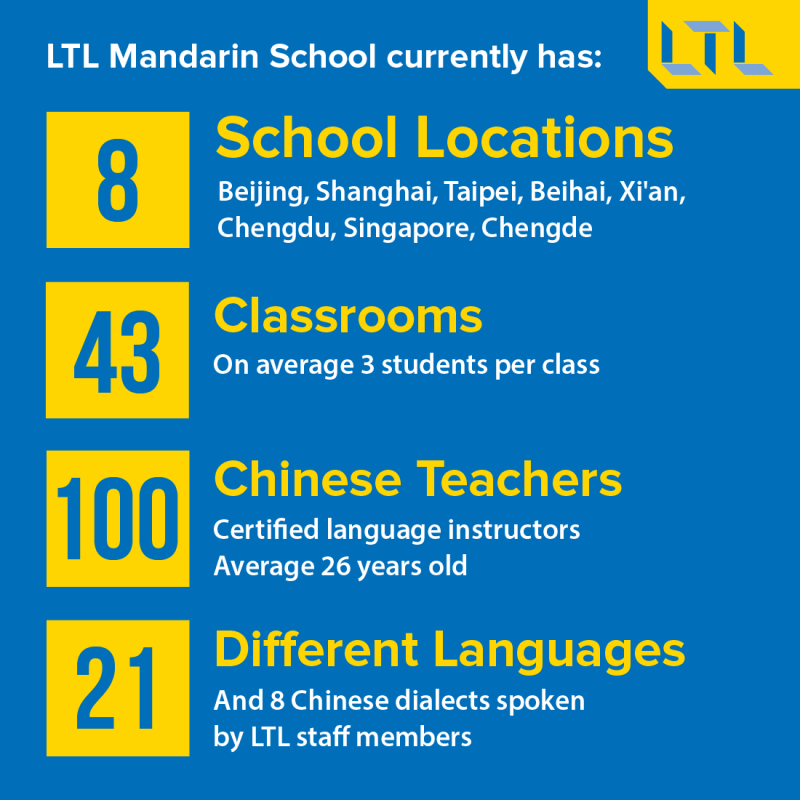
University vs Language School – Testimonials
You already know my background and experiences if you read this much, but I thought you’d like to hear other people opinions about their experience. Here, Andreas and Alex share their experience of studying Chinese in a Chinese University.
Let’s have a look at what some of our team members have to say about their experiences:
Andreas Laimböck, LTL’s Founder
Beijing Language and Culture University (BLCU), Mandarin – 2002-03
“Starting as a complete beginner, my experience was both great but also disappointing. We were 20 students in the class, there was a great student community and I met loads of great people there.
I met people from all over the world, except China.
Foreign and Chinese students study in different buildings, live in different dormitories and there is almost no interaction at all.
Whenever we got to speak to Chinese students it was for them to practice their English, as they spoke much better English than I did Mandarin back then.
So while I had a great time at university I came to China to learn Mandarin. So during the 2nd semester I decided to drop out and start learning Mandarin myself.
I got a Chinese tutor and moved in with some Chinese friends (a kind of homestay). They did not want to practice English with me but actually make friends. That was when I finally started to master tones and my pronunciation improved very quickly.
I really started to progress quickly and I learned much more in those three months than I had in the seven at university beforehand.”
Alexander Krasnov, LTL Taipei School Director
Renmin University, Beijing, Chinese Language Semester – 2010
“The study program worked based on a 3 hour per day schedule, starting from 8am and finishing at 11:30am, with half an hour break in between.
The classes were themed based on four topics: Speaking, Listening, Reading and Comprehensive. In the afternoon, you could sign up for extra elective classes for Business Chinese, grammar Points and a few others.
The class had 9 students in total, while the other Groups had a similar amount or somewhat more, with some classes having as many as 20 students.
The Good
- Environment – There is something fun and engaging about living in a “university town”. There was considerably more activities, social clubs and things going on than in my own university in Israel. The abundance of food in the various cafeterias, stands and restaurants around the school grounds was also a major plus, with lots of it being really cheap for students.
- Student Body – The backgrounds of students who were taking the Chinese classes was extremely diversified and international, having students from literally anywhere in the world.
- HSK – One extra convenient aspect of studies in Renda was that the university was also a Testing Center. When I took the exams, I didn’t need to do anything except sign up in advance and then appear on the day a few minutes early to take it.
The Bad
- Classes – All classes were a mix and match of all of them. The Speaking classes had a big component of reading from the book, while the Reading part was more about Literary Theory rather than actual Reading Comprehension. One main reason why my grades in specifically that class were particularly low was that the final exam had more questions that required memorization of the different types of literature rather than actually understanding texts.
- Social – I joined the program from the 2nd Semester in February, and missed the 1st Semester. Due to this, I don’t think I could enter the social circles very easily and felt quite lonely at the start. One good thing that came out of this was that due to not hanging out with the foreign students group, I had to go out and “force myself” onto Chinese locals who were studying in the university or otherwise were in the area. As a consequence of this, I eventually ended up having considerably more Chinese friends than foreign ones.”
Student Reviews of LTL Mandarin School
You might not take our word for it, so here are some reviews from our own students about studying Chinese at LTL, a Chinese language school based in China.
Frederic, Belgium
“At LTL I chose the small group classes. It turned out to be a great choice for me. Before the start of the classes my level in Chinese was very low.
I had some group classes (in very large groups of 20 persons) many years ago in Belgium. At LTL I was in a small group of 4 people.
We were all at a similar level but from different nationalities and ages which provided for a great mix. There was one German, a Brit and an American. This made it really fun because we could compare how each person would say or do things in their own country, or help each other out when needed.”
Maxime, France
“After having been a student at the university in Taipei, where I first discovered Mandarin, I found a job in Taiwan.

Even if I was working during the day, I was still eager to continue my Mandarin learning experience.
However, I was facing a problem : I wasn’t able to find any university which was able to propose a program time that would match with my working schedule.
As a consequence, I searched among the private schools what would be a good fit for my needs.
After having done some considerable search about mandarin schools in Taipei, I decided to pick LTL Mandarin School which features all the criteria : evening classes, small group (more or less 5 people), workbook based learning, central location in Taipei (Da’an District), agreeable premises & skilled teachers, affordable programs.”






Things To Know Before Studying a Language Abroad
If you are considering studying a language abroad, in a university or language school, there are a few things to know before leaving your home country.
This advice we learned the hard way! We are happy to share some of them with you here, and even more with China-specific ones in our blog here.
Start Learning Fast
No matter what language you are choosing to study, if you are considering it, make the leap and start learning fast!
You don’t have to be fluent before studying abroad, you are specifically going there to study the language!
However, it is always good to know a few words and sentences before your arrival, to help you settle during the first few days of your stay.
In some countries, people don’t speak English. It’s better to know the basics of the language to make things easier (think take a taxi, book a room in a hotel, buy food etc)
The Foreign Bubble
If you’re considering studying a language abroad rather than taking a language course at home, you probably want to make as much progress as possible in a given period of time.
Here’s one of our best pieces of advice: don’t stay in the foreign bubble and make local friends.
It’s easy to stay around people that speak your language rather than putting effort into forming sentences and struggling to be understood in a foreign language, especially in the first stages of the learning journey.
But believe us when we say complete immersion into the language, which can be done by making local friends and only speak your study language with them, is the best way to make fast language progress.
Download the Relevant Apps

Most English speaking countries use WhatsApp to communicate, China uses WeChat, Taiwan and Japan use Line, South Korea would be KakaoTalk…
It’s better to do some research and download the relevant apps before arriving in the country, so you can avoid any surprises after arrival.
Other than instant messaging apps, it could be interesting to also download apps that are used everyday in the country and could make your life a little bit easier: subway maps, dictionary, taxi apps, shopping apps…
Be Aware of Restrictions
It’s always good to know what you can and can’t do in a given country, so you are fully prepared to immerse yourself and start your language journey smoothly.
If we take the example of China, did you know you cannot access Western social media apps and others such as Facebook, Instagram, YouTube and Netflix?
You’ll need a VPN to access all of them. Otherwise, you can have a try at the Chinese social apps!
Be Prepared For A Culture Shock
Every single country will be different from the next, and you might find certain things harder to accept than others.
Discovering and immersing yourself in the country’s culture and tradition is all part of the experience.
Keep an open mind and remember, what you might find unusual and disturbing is actual the country’s “normal”.
Embrace these differences and your stay will be even more pleasant!

Things I Wish I Knew Before Coming To China 🧳 (Top 12 To Remember)
Moving to China? Learn from the mistakes the LTL team. It’s different to what you are used to, be prepared with our handy list of ultimate pre-China tips.
Did you study your language program at University or in a Language School?
Let us know in the comments!
Hopefully this blog has helped give you a clearer idea of what both institutions have to offer, so you can make your decision based on all the information you got.
If you’re still unsure where to study, online at home or in a classroom, feel free to visit our blog about Online vs Offline Learning which also follow a Q&A approach with tables of pros and cons.
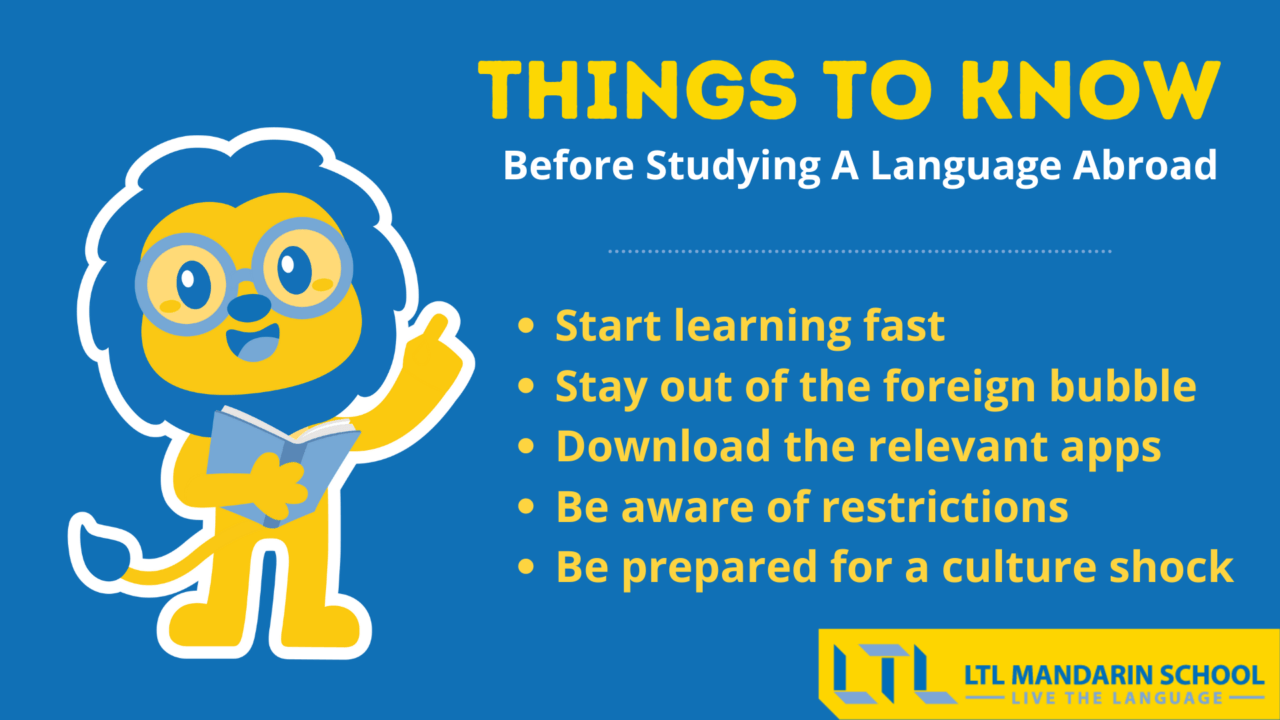
University vs Language School – FAQ’s
What’s the difference between University and Language School?
A university is an institution of higher education offering under graduate and graduates programs that can also lead to a PhDs or doctorates. Most of the time universities are funded by the state, but they can also receive private donations.
They basically offer training in a lot of various domains, such as social science, medicine, law etc. Local and foreign students can study in universities.
Language Schools are (most of the time) privately owned and do not depend on state funding. They offer programs in various foreign languages, and in the case of some language schools like LTL Mandarin School, schools offer courses in one specific language in the country of the language’s origin.
LTL Mandarin School for example is a private language school based in China, offering Mandarin Chinese courses to students from all over the world.
What’s the pros and cons of studying a language at University?
Pros – Studying a language in a university at home is a great way to ease into learning languages. You can take other classes on the side and enjoy life on campus, with lots of activities and clubs to join.
Cons – Class sizes are pretty big which allows less time to practice and speak the language studied. For obvious reasons the environment is not as immersive as it would have been abroad, and you need to start your study program at fixed dates with no flexibility.
What’s the pros and cons of studying a language in a Language School?
Pros – Studying a language in a language school abroad allows for a complete immersive environment, which means you can keep learning outside of the classroom. Class sizes are usually kept small (under 6 students per class) allowing for plenty of practice time. As a smaller institution, assistance and guidance is more personalised.
Cons – Again, as a small institution there will be less social activities compared to campus life at a university, meaning the number of people you’ll meet will also be less important. Private schools abroad also comes at a certain cost.
Which is better, University or Language School?
There is no fixed answer to that question, as we all study and make progress in different ways.
As we’ve seen previously, whilst university will be a bigger setting and large social environment, class sizes won’t allow for much practice and won’t be very culturally immersive.
A language school abroad will be a lot smaller in scale, allowing for smaller classes and thus more chance to speak and get the teacher’s attention. Immersion in both the language and culture will be deep and important, but is not for everyone.
Studying a foreign language at university and a language school are both good options.
Your choice will come down to what your goals are.
Which is better, Online vs Offline Learning?
This question is difficult to answer, as everyone’s situation is different. One might prefer a type of learning rather than the other according to their needs and availabilities.
If you have a training center close to your location, prefer to travel and study in another place than your hometown, then offline learning is absolutely fine.
If you prefer to stay home, need more flexible hours, don’t have the budget for a far away school or just learn better with digital technologies, then online learning is a great option.
Check out our article on online vs offline learning here.
Want more from LTL?
Want to learn Chinese from the comfort of your own home? Then our 24/7 online Chinese lessons might be the thing for you.
We offer a 7 day free trial to all new online students where you can study Mandarin 24/7.
Come and check it out free of charge and see what you think!
If you wish to hear more from LTL Language School why not join our mailing list?
















 Hi, my name is Manuel! I am from Spain and I am a Student Advisor at LTL. I’m now based at our Seoul School after living 3 years in Taipei.
Hi, my name is Manuel! I am from Spain and I am a Student Advisor at LTL. I’m now based at our Seoul School after living 3 years in Taipei. Hi, my name is Mojca! I am from Slovenia in Europe and I work as a student advisor at our Shanghai school.
Hi, my name is Mojca! I am from Slovenia in Europe and I work as a student advisor at our Shanghai school.





2 comments
What are the main differences between studying at a university and a language school?
University - bigger classes, fixed schedules, no immersion
Language school - small classes, more flexible, immersive